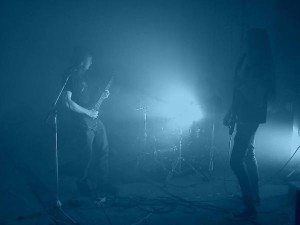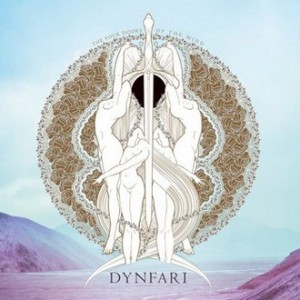 DYNFARI plays black metal influenced, heavily atmospheric music. Since its formation as a duo in 2010 this now fully formed Icelandic band has made four albums. Armed with candlelight and incense, the band’s hypnotizing live performances elevate all senses into another world. Dynfari’s lyrical themes deal with the philosophy of life, death, the universe, loss, hope and sorrow.
DYNFARI plays black metal influenced, heavily atmospheric music. Since its formation as a duo in 2010 this now fully formed Icelandic band has made four albums. Armed with candlelight and incense, the band’s hypnotizing live performances elevate all senses into another world. Dynfari’s lyrical themes deal with the philosophy of life, death, the universe, loss, hope and sorrow.
The Four Doors of the Mind album introduction by Jóhann Örn (singer and guitarist of DYNFARI) : „It would be a cliché to say that this album is a journey. But it explores a subject that’s been an inspiration to countless heavy metal lyrics. Though here, instead of depicting pain, madness and death as something ugly or morbid, it is construed as something beautiful and important. Some would say that it’s counter-intuitive that the first half of the album includes the most obvious black metal influences, while that part deals with the doors of sleep and forgetting, while the more mellow, beautiful second half is about madness and death. But it is quite logical and intentional. While sleep and forgetting are the first reactions to pain, sometimes they are not enough, and pain is still thriving. In such circumstances, it is not until you reach the doors of madness and death where you will ultimately fin d peace.
The last song of the album exemplifies this, where at first it seems as if death is something eerie or even scary, but it is then accepted and welcomed as something beautiful and inevitable. There is nothing to fear in a state of bliss and peace. This song actually used to ha ve the working title “Geislun” (“Radiation”) which is a concept closely related to illness and death, making sense in relation to the idea of acceptance of one’s fate and in that process finding calmness through it. Of course, the core of these ideas on the album’s concept are not mine, but a combination of two sources. Firstly, the poetry of early 20th century Icelandic existentialist Jóhann Sigurjónsson, and secondly contemporary fantasy writer Patrick Rothfuss’ theory put forth in his novel “The Name of the Wind”. Coincidentally, the archaic word “Dynfari” is a name for wind or storm. Furthermore, the Icelandic poet Jóhann Sigurjónsson has the same first and last name as myself. Seeing the similarities in comparing his poetry to the idea in Rothfuss’ book, it just seemed too much of a coincidence not to do an ything with it. The music we were creating at the time was very much in tune with these musings and heavily related to my personal state of mind. So as I was finding it difficult to relate my own writing at the time to our music, this seemed to fit so perfectly that it was impossible to let it go.
ve the working title “Geislun” (“Radiation”) which is a concept closely related to illness and death, making sense in relation to the idea of acceptance of one’s fate and in that process finding calmness through it. Of course, the core of these ideas on the album’s concept are not mine, but a combination of two sources. Firstly, the poetry of early 20th century Icelandic existentialist Jóhann Sigurjónsson, and secondly contemporary fantasy writer Patrick Rothfuss’ theory put forth in his novel “The Name of the Wind”. Coincidentally, the archaic word “Dynfari” is a name for wind or storm. Furthermore, the Icelandic poet Jóhann Sigurjónsson has the same first and last name as myself. Seeing the similarities in comparing his poetry to the idea in Rothfuss’ book, it just seemed too much of a coincidence not to do an ything with it. The music we were creating at the time was very much in tune with these musings and heavily related to my personal state of mind. So as I was finding it difficult to relate my own writing at the time to our music, this seemed to fit so perfectly that it was impossible to let it go.
Some might ask what makes an Icelandic man in his 20s to want to dabble in writings about pain and devote his music to the su bject. The truth of the matter is that I was diagnosed with an autoimmune disease and as a byproduct of it and its treatments I have endured pains that some medical experts describe as more painful than childbirth. I am quite healthy now, having found the right balance between three different kinds of medication. But I have found it difficult to not relate my music creation somehow to this fact and the philosophical mind games it induces. Even in the wake of intense pain, it is th e battle against your mind that is the most challenging one. The battle for positivity is a constant one – and it is just a little bit funny that one of the most successful strategies on that battlefield, I’ve found, is accepting your fears, accepting your fate, and believing that while the current situation may be beyond bloody shitty and intense, there is ultimately peace to be found. It is the only thing that is certain. No matter what.“
Line-up:
Jóhann Örn – vocals, guitars
Jón Emil – percussion
Hjálmar – bass
Bragi – guitar
Older interview for Rumzine: http://en.rumzine.com/dynfari/
